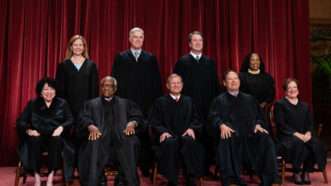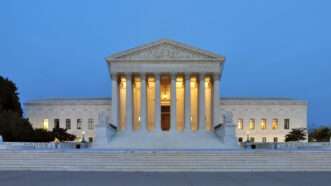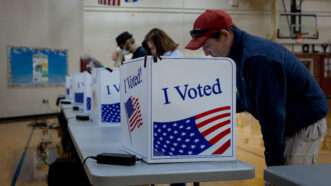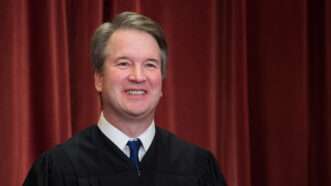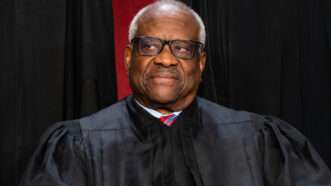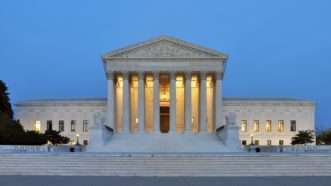Supreme Court
Study Estimates Nearly 96% of Private Property Is Open to Warrantless Searches
The Institute for Justice says its data show that a century-old Supreme Court doctrine created a huge exception to the Fourth Amendment.
Abortion Pill Studies Retracted: Politics or Science?
"Following the science" as the Supreme Court considers the safety and efficacy of medical abortions.
FIRE Highlights the Blatant Hypocrisy of State Officials Who Decry Government Meddling With Social Media
Even as they attack the Biden administration's crusade against "misinformation," Missouri and Louisiana defend legal restrictions on content moderation.
New Lawfare Article on "What the Supreme Court Got Wrong in the Trump Section 3 Case"
I argue that the justices botched the legal analysis and relied too much on questionable policy considerations.
SCOTUS Takes on Chevron Deference
New Jersey fishermen are challenging a 40-year-old precedent that gives executive agencies too much power.
Michael Rappaport on "the Originalist Disaster" of the Supreme Court's Ruling in Trump v. Colorado
A leading originalist legal scholar explains what the Court got wrong.
Should Justice Sotomayor Retire? Some People Think So.
Some liberals and progressives think Justice Sotomayor should retire this year to ensure a Democratic President names her replacement.
Supreme Court Tells Texas to Hold On
Plus: More reactions to the Supreme Court's other decision in the Trump ballot disqualification case, D.C.'s continued minimum wage confusion, California's primary elections, and more...
Were There Last Minute Changes to Trump v. Anderson?
There are reasons to suspect the justices were wrangling over language up until the last minute.
Rank Choices
Plus: A listener asks the editors for short quotes from fictional works that are representative of libertarian ideas.
Supreme Court Unanimously Rules That States May Not Disqualify Trump As an Insurrectionist
Three justices who concurred in that judgment accuse the majority of trying to "insulate all alleged insurrectionists from future challenges" by going further than necessary.
Town Says Burger Joint's Mural Can't Show Any Burgers
Salina, Kansas, restaurant owner Steve Howard argues in a new lawsuit that the city's sign regulations violate the First Amendment.
California Violated the Second Amendment by Disarming People Based on Nullified Convictions
A federal judge ruled that three men who committed nonviolent felonies decades ago are entitled to buy, own, and possess guns.
The Supreme Court's Grant in Trump v. U.S. (UPDATED)
The justices reframed the question presented in the case and expedited its consideration.
SCOTUS Takes on Trump
Plus: Balkan begging, California corruption, Russian gravediggers, and more...
SCOTUS Ponders the Implications of Prosecuting Gun Owners for a Crime Invented by Bureaucrats
Several justices seemed troubled by an ATF rule that purports to ban bump stocks by reinterpreting the federal definition of machine guns.
Supreme Court Looks Poised To Gut Restrictive Social Media Laws
The First Amendment restricts governments, not private platforms, and respects editorial rights.
Texas and Florida Say the First Amendment Must Be Sacrificed to Save It
Supreme Court arguments about two social media laws highlight a dangerous conflation of state and private action.
Preview of Supreme Court Bump Stock Case
In Cargill v. Garland, the Court should apply the National Firearms Act text that Congress did enact, and not the text that gun control advocates wish had been enacted.
Most Justices Seem Skeptical of the Florida and Texas Social Media Laws
The Supreme Court seems inclined to recognize that content moderation is protected by the First Amendment.
Supreme Court Seems Likely to Strike Down Florida and Texas Social Media Laws
The laws violate the First Amendment because they require social media sites to abjure most content moderation, and platform speech they disapprove of.
Teaching Constitutional Law in a Crisis of Judicial Legitimacy
The real crisis seems to be in academia, not at the Court
Texas and Florida Want the Supreme Court To Bless Their Unconstitutional Social Media Laws
Both states are trying to force tech companies to platform certain sorts of speech.
The Justice Department Quietly Ends Reprosecution of Man Who Received Clemency From Trump
Philip Esformes was sentenced for charges on which a jury hung. After receiving a commutation, the federal government vowed to try to put him back in prison.
Did Justice Jackson Disclose the Outcome in Relentless and Loper-Bright? (UPDATED)
Did we get a hint to the outcome in one of this term's bigger cases at today's oral argument?
After Supreme Court Denies Cases, Clarence Thomas Offers Hope to Rent Control Critics
Thomas agreed with the Court's decision to not take up two challenges to New York's rent stabilization law but said the constitutionality of rent control "is an important and pressing question."
Justice Kavanaugh Still Wants SCOTUS To Hear More Cases
The Supreme Court's docket may be awfully small, but it's not Justice Kavanaugh's fault.
Supreme Court Denies Red State Effort to Intervene in Mifepristone Case
The Court also rejects a late-filed amicus briefs from the American Bar Association, but accepts one from former FDA Commissioners.
This Prosecutor Secretly Worked for the Judges Overseeing His Cases. Will His Victims Be Able To Sue?
Ralph Petty likely violated the Constitution. In a rare move, a federal court signaled this week that lawsuits against him may not be dead on arrival.
Qualified Immunity Is Not Limited to Police Brutality. It Protects a Wide Variety of Abusive Officials.
An analysis of appeals involving the doctrine finds that less than a quarter "fit the popular conception of police accused of excessive force."
This 70-Year-Old Woman Might Lose Her $377,000 Home Over a Small Tax Debt
The Supreme Court supposedly put an end to “home equity theft” last year. But some state and local governments have found a loophole.
SCOTUS Is Troubled by the Claim That States Can Disqualify Trump From the Election As an Insurrectionist
Most of the justices are clearly inclined to reject a Colorado Supreme Court decision asserting that power under Section 3 of the 14th Amendment.
Cops Arrested Him for a Fictitious Traffic Violation Because He Flipped Them Off
A federal judge allowed a lawsuit against the officers to proceed, finding evidence of several constitutional violations.
While Attention Was on Oral Argument in Trump v. Anderson, the Supreme Court Issued Two Opinions
Things you may have missed between the Trump disqualification case, Biden special counsel report, and NBA trade deadline.
Thoughts on the Supreme Court Oral Argument in the Trump Section 3 Case
The justices might well overrule the Colorado Supreme Court on the grounds that only Congress has power to enforce Section 3 of the 14th Amendment. Such a ruling would be a serious mistake.
Hawaii's Supreme Court Insists There Is No Individual Right to Arms
Rejecting a challenge to the state's strict gun laws, the court is openly contemptuous of Second Amendment precedents.
Was Amazon 'Free to Ignore' White House Demands That It Suppress Anti-Vaccine Books?
The Biden administration's interference with bookselling harks back to a 1963 Supreme Court case involving literature that Rhode Island deemed dangerous.
Based on Loose Reasoning, a Federal Judge Rejects a Challenge to the Gun-Free School Zones Act
The decision likens the federal law to Reconstruction era restrictions on firearms near polling places.
The D.C. Circuit Unanimously Rejects Trump's Audacious Presidential Immunity Claim
The appeals court says it "cannot accept that the office of the Presidency places its former occupants above the law for all time thereafter."
Whether Chevron Stands or Falls, Any Deference Should Be Based Upon Delegation, Not Ambiguity
Some thoughts on the most important issue in Relentless and Loper Bright.
He Was Arrested for Making a Joke on Facebook. A Jury Just Awarded Him $205,000 in Damages.
The verdict vindicates the constitutional rights that Louisiana sheriff's deputies flagrantly violated when they hauled Waylon Bailey off to jail.
My Supreme Court Amicus Brief in Trump v. Anderson - the Section 3 Disqualification Case
The brief explains why a criminal conviction is not necessary for Trump to be disqualified from the presidency under Section 3 of the 14th Amendment.
She Was Arrested for Her Journalism. A Federal Court Says She Can't Sue.
Priscilla Villarreal, also known as "Lagordiloca," has sparked a debate about free speech and who, exactly, is a journalist.
Justice Sotomayor Voices Her Frustration with Supreme Court and Advocates
Some candid remarks at the University of California at Berkeley
No, Texas Has Not "Defied" The Supreme Court
Perhaps Governor Abbott will flout a directive from the Supreme Court in a future case, but reports of Texas "defying" the Supreme Court are bunk, and many making such claims should know better.
A Constitutionally Dubious California Bill Would Ban Possession of AI-Generated Child Pornography
The proposal seems to conflict with a Supreme Court ruling against laws that criminalize mere possession of obscene material.




